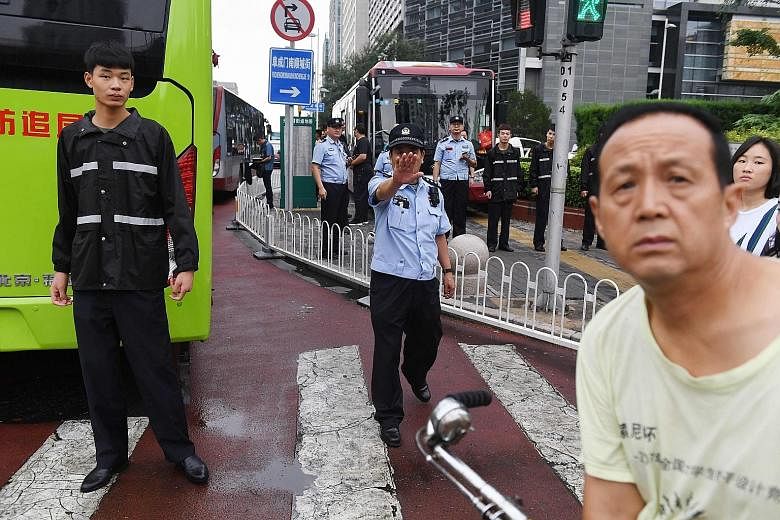BEIJING • Hundreds of police officers patrolled the streets of Beijing's financial district yesterday as the Chinese authorities clamped down on a planned protest against losses sustained in risky peer-to-peer (P2P) lending platforms.
Enraged over financial losses, petitioners told Agence France-Presse (AFP) they had come from every corner of China - from the southernmost province of Guangdong to the far-west region of Xinjiang - in hopes that by gathering en masse, the government would recognise their grievances and take action.
But the authorities appeared to have other plans.
More than 120 buses lined the roads around the China Banking Regulatory Commission, where the protest was supposed to take place.
The line of buses stretched all the way to Beijing's Diaoyutai state guesthouse 3km away.
Security forces rounded up groups of petitioners from the surrounding streets and parks and drove them away in the buses under police escort.
A man in plainclothes sealed the windows of one vehicle shut with clear tape before it was driven away.
A policeman told AFP the petitioners would be taken to a neighbourhood on the outskirts of Beijing, where China maintains what rights activists describe as "black jails".
Petitioners are typically held there until minders escort them back to their home towns. "Cases sent there are essentially sent into a black hole - people never get any results and end up like characters in Waiting For Godot," said Mr Patrick Poon, China researcher for Amnesty International, referring to the play.
China's P2P industry, worth some US$195 billion (S$266 billion), according to Bloomberg News, is the world's largest but is highly risky and unregulated.
The cumulative number of failed Chinese P2P firms has soared in recent years, from just 93 in 2013 to 4,334 as of this June, Bloomberg cited Shanghai-based P2P consultancy Yingcan Group as saying.
In July alone, 164 firms were identified as "problematic platforms" from which investors could no longer withdraw their funds, according to P2P database Wangdaizhijia.
Possibly more than 8,000 people were expected at the protest, one petitioner said, a claim that was echoed in what purported to be a leaked government document circulating online. It could not be independently verified.
According to the document, cyber-security authorities identified 8,370 people from 32 of the country's 34 provinces, districts and cities who planned to come to Beijing after organising on social media.
The missive, addressed to public security bureaus nationwide, directs them to "closely watch the movements of relevant people and carry out stability and control work in a timely manner towards active organisers, people buying tickets to Beijing, and other such key people to strictly prevent a large gathering in Beijing and ensure that society remains stable".
AGENCE FRANCE-PRESSE

